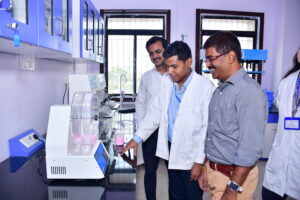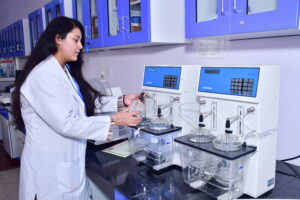Department of Biopharmaceuticals
Overview
The global biologics market was USD 335 billion in 2021, and it is expected to grow at an 8.5% CAGR and is projected to reach USD 817 billion. The global biosimilar market is estimated at USD 16 billion and is poised to reach USD 45 billion in 2026, Market growth is largely driven by the rising incidence of chronic disease and increasing demand for biosimilars for their cost-effectiveness. Regulatory approvals and other regulations favoring biosimilar adoption in different countries are also a major driving force in the global market. The complexity associated with manufacturing biosimilars and the resistance from reference biologics are expected to limit the growth of the biosimilar market.
India is a significant player in the world in the manufacturing and use of biosimilars. The Indian biosimilar market was approximately US$300 million in 2015. The domestic sales are close to US$250 million and growing at a compound annual growth rate of 14%. The export of biosimilars or similar biologics from India stands at a staggering US$51 million. India has the potential to become a global player in similar biologics, or biosimilars. According to the ASSOCHAM-Sathguru report released in 2016, biosimilars present a US$240-billion global opportunity to the Indian biopharmaceutical industry, and the domestic market is expected to grow by US$ 40 billion by 2030. The institute of Medical Sciences healthcare report also envisages a similar opportunity for Indian biopharmaceutical companies associated with the manufacturing and marketing of biosimilars.
The Department of Biopharmaceuticals is the newest addition to the NIPER, Hajipur, to cater to national and transnational needs, starting from this academic year, i.e. 2023-24. Affordable biopharmaceutical products such as monoclonal antibodies, biosimilars, recombinant proteins, vaccines, etc. are in need in our country. The new department is opened with a vision to provide high-quality education and training to the students in the different aspects of biopharmaceuticals product design and development.
Courses offered
- M.Tech. in Biopharmaceuticals
- Ph.D. in Biopharmaceuticals
Research areas
- Generation of antibodies by fermentation, hybridoma technology, etc.
- Phage display, yeast surface display, and antibody engineering
- Therapeutic protein development occurs through bacterial, fungal, or baculovirus expression systems
- Biochemical engineering, fermentation technology, and downstream processing
Faculty







